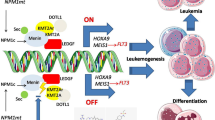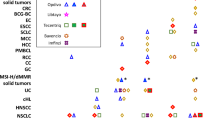Summary
Lenalidomide (Revlimid®, also known as CC-5013) and pomalidomide (CC-4047) are IMiDs and chemical derivatives of thalidomide. Lenalidomide was introduced in 2004 and is currently approved for treatment of multiple myeloma and 5q-myelodysplastic syndromes (MDS). In addition, IMiDs are currently tested in a wide variety of haematological as well as solid tumours. IMiDs have three main anti-tumour properties, i.e. a direct anti-tumour effect, an inhibitory/modulatory effect on the tumour stroma/microenvironment supporting growth and survival of tumour cells including anti-angiogenic properties as well as a very potent immunomodulatory effect. The latter includes activation of T, NK and NKT cells as well as modulation of the function of mononuclear cells (DC and monocytes). However, the exact anti-cancer mechanisms of IMiDs in vivo remain elusive so far. This brief review will focus on the current concepts explaining the anti-cancer effects of IMiDs.
Similar content being viewed by others
References
Dimopoulos M, Spencer A, Attal M, Prince HM, Harousseau JL, Dmoszynska A, et al. Lenalidomide plus dexamethasone for relapsed or refractory multiple myeloma. N Engl J Med, 357(21): 2123–2132, 2007
List A, Dewald G, Bennett J, Giagounidis A, Raza A, Feldman E, et al. Lenalidomide in the myelodysplastic syndrome with chromosome 5q deletion. N Engl J Med 355(14): 1456–1465, 2006
Verhelle D, Corral LG, Wong K, Mueller JH, Moutouh-de Parseval L, Jensen-Pergakes K, et al. Lenalidomide and CC-4047 inhibit the proliferation of malignant B cells while expanding normal CD34+ progenitor cells. Cancer Res, 67(2): 746–755, 2007
LeBlanc R, Hideshima T, Catley LP, Shringarpure R, Burger R, Mitsiades N, et al. Immunomodulatory drug costimulates T cells via the B7-CD28 pathway. Blood, 103(5): 1787–1790, 2004
Haslett PA, Hanekom WA, Muller G, Kaplan G. Thalidomide and a thalidomide analogue drug costimulate virus-specific CD8+ T cells in vitro. J Infect Dis, 187(6): 946–955, 2003
Ramsay AG, Johnson AJ, Lee AM, Gorgun G, Le Dieu R, Blum W, et al. Chronic lymphocytic leukemia T cells show impaired immunological synapse formation that can be reversed with an immunomodulating drug. J Clin Invest, 118(7): 2427–2437, 2008
Galustian C, Meyer B, Labarthe MC, Dredge K, Klaschka D, Henry J, et al. The anti-cancer agents lenalidomide and pomalidomide inhibit the proliferation and function of T regulatory cells. Cancer Immunol Immunother, 2008
Chang DH, Liu N, Klimek V, Hassoun H, Mazumder A, Nimer SD, et al. Enhancement of ligand-dependent activation of human natural killer T cells by lenalidomide: therapeutic implications. Blood, 108(2): 618–621, 2006
Lapalombella R, Yu B, Triantafillou G, Liu Q, Butchar JP, Lozanski G, et al. Lenalidomide down-regulates the CD20 antigen and antagonizes direct and antibody-dependent cellular cytotoxicity of rituximab on primary chronic lymphocytic leukemia cells. Blood, 112(13): 5180–5189, 2008
Corral LG, Haslett PA, Muller GW, Chen R, Wong LM, Ocampo CJ, et al. Differential cytokine modulation and T cell activation by two distinct classes of thalidomide analogues that are potent inhibitors of TNF-alpha. J Immunol, 163(1): 380–386, 1999
Payvandi F, Wu L, Haley M, Schafer PH, Zhang LH, Chen RS, et al. Immunomodulatory drugs inhibit expression of cyclooxygenase-2 from TNF-alpha, IL-1beta, and LPS-stimulated human PBMC in a partially IL-10-dependent manner. Cell Immunol, 230(2): 81–88, 2004
Lu L, Payvandi F, Wu L, Zhang LH, Hariri RJ, Man HW, et al. The anti-cancer drug lenalidomide inhibits angiogenesis and metastasis via multiple inhibitory effects on endothelial cell function in normoxic and hypoxic conditions. Microvasc Res, 2008
Ebert BL, Pretz J, Bosco J, Chang CY, Tamayo P, Galili N, et al. Identification of RPS14 as a 5q-syndrome gene by RNA interference screen. Nature, 451(7176): 335–339, 2008
Pellagatti A, Jadersten M, Forsblom AM, Cattan H, Christensson B, Emanuelsson EK, et al. Lenalidomide inhibits the malignant clone and up-regulates the SPARC gene mapping to the commonly deleted region in 5q-syndrome patients. Proc Natl Acad Sci USA, 104(27): 11406–11411, 2007
Author information
Authors and Affiliations
Corresponding author
Rights and permissions
About this article
Cite this article
Wolf, D. IMiDs induce pleiotropic anti-cancer effects. memo 2 (Suppl 1), 10–12 (2009). https://doi.org/10.1007/s12254-009-0097-7
Received:
Accepted:
Issue Date:
DOI: https://doi.org/10.1007/s12254-009-0097-7




